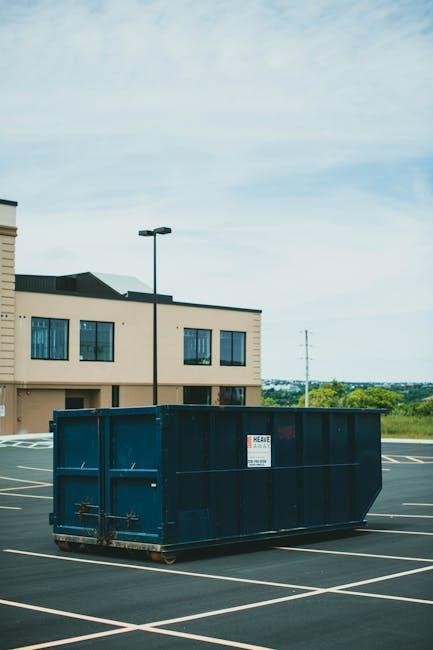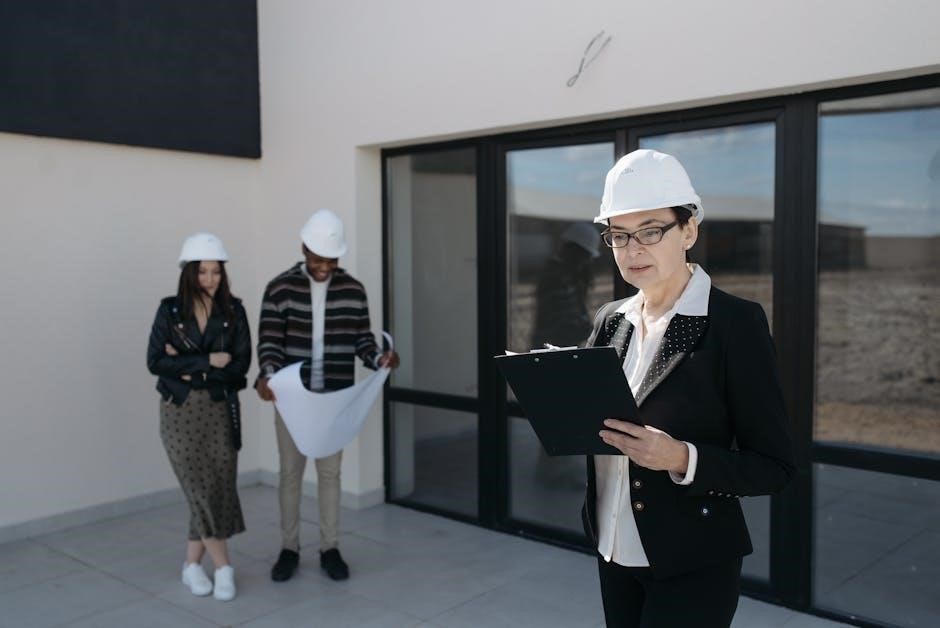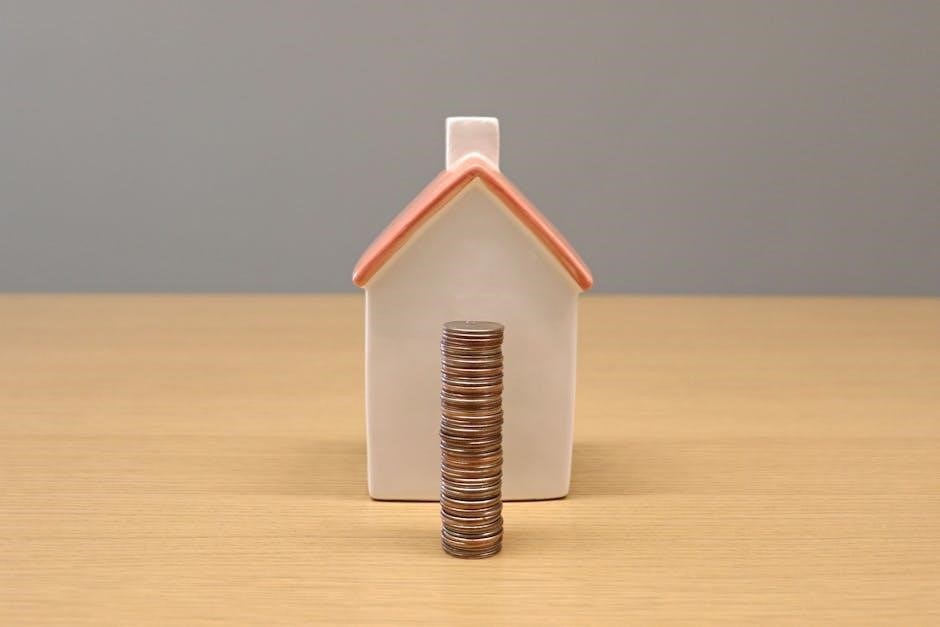Property management involves overseeing real estate to maximize value and ensure smooth operations․ It includes maintenance, tenant relations, financial tasks, and legal compliance, requiring a blend of organizational and interpersonal skills to balance these responsibilities effectively․
Overview of Property Management
Property management encompasses a broad range of activities aimed at maintaining and enhancing the value of real estate․ It involves overseeing daily operations, ensuring compliance with laws, and balancing the interests of property owners and tenants․ Key functions include handling maintenance, managing tenant relationships, and optimizing financial performance․ Property managers act as intermediaries, addressing tenant needs while protecting the property’s integrity and profitability․ Their role also extends to administrative tasks, such as record-keeping and vendor coordination․ Effective property management requires strong organizational, communication, and problem-solving skills to ensure smooth operations and long-term property appreciation․
Key Objectives of Property Management
The primary objectives of property management are to maximize property value, ensure tenant satisfaction, and maintain regulatory compliance․ Property managers aim to create a positive environment for tenants while protecting the property’s long-term interests․ They focus on enhancing asset value through effective maintenance, tenant retention, and financial optimization․ Additionally, they strive to build trust and mutual respect between property owners and tenants, fostering a harmonious relationship․ Achieving these objectives requires a proactive approach to addressing challenges, ensuring sustainability, and continuously improving property operations to meet evolving market demands and stakeholder expectations․
Mutual Respect, Trust, and Benevolence in Property Management

Mutual respect, trust, and benevolence are foundational to effective property management․ These principles foster positive relationships between property managers, tenants, and owners, creating a collaborative environment․ Trust is built through transparency and reliability in handling responsibilities, while respect ensures fair treatment and open communication․ Benevolence, or goodwill, promotes a culture of understanding and support, addressing tenant needs and resolving conflicts amicably․ These values are essential for maintaining harmony and ensuring that all parties feel valued, leading to long-term satisfaction and successful property operations․ They underpin ethical practices and contribute to a positive reputation in the property management industry․

Property Maintenance and Upkeep
Property maintenance ensures the preservation and enhancement of property value through regular inspections, repairs, and improvements, addressing both routine and emergency needs promptly and effectively․
Routine Maintenance and Repairs
Routine maintenance and repairs are essential for preventing property deterioration․ Property managers schedule regular inspections to identify and address issues before they escalate, ensuring systems function optimally․ This includes HVAC, plumbing, and electrical checks, as well as landscaping and pest control․ Timely repairs maintain tenant satisfaction and prevent costly damages․ Managers must also keep detailed records of all maintenance activities for accountability and future planning․ Proactive maintenance strategies not only preserve the property’s value but also enhance its appeal and safety, making it a critical component of effective property management․ Regular upkeep ensures a well-maintained and secure living or working environment․
Handling Emergency Repairs and Situations
Handling emergency repairs and situations is a critical duty of property managers․ Emergencies, such as plumbing bursts, electrical failures, or structural issues, require immediate attention to prevent further damage and ensure safety․ Property managers must have a rapid response plan, including a list of reliable contractors and 24/7 availability to address urgent matters․ They coordinate repairs, communicate with tenants to minimize disruptions, and ensure compliance with safety regulations․ Additionally, managers must maintain an emergency fund to cover unexpected expenses․ Prompt action in emergencies not only protects the property but also maintains tenant trust and satisfaction, preventing potential legal or financial repercussions․
Supervising Property Improvements and Renovations
Supervising property improvements and renovations is a key responsibility of property managers․ This involves overseeing projects to enhance the property’s value, functionality, and aesthetic appeal․ Managers coordinate with contractors, ensure compliance with building codes, and monitor timelines and budgets; They also communicate with tenants to minimize disruptions during renovations․ Effective supervision ensures that improvements align with the property’s long-term goals and meet stakeholders’ expectations․ By managing renovations efficiently, property managers can increase rental income, improve tenant satisfaction, and maintain the property’s competitive edge in the market․ Proper planning and execution are essential to achieve successful outcomes and maximize the property’s potential․

Tenant Management Responsibilities
Tenant management involves screening, selecting, and maintaining positive relationships with tenants․ It includes preparing lease agreements, addressing complaints, and ensuring tenant satisfaction while adhering to rental policies․
Tenant Screening and Selection Process
Tenant screening involves evaluating potential renters to ensure reliability and suitability․ Property managers review applications, conduct background checks, and verify employment and rental histories․ They assess creditworthiness and financial stability to minimize risks․ The selection process aims to identify responsible tenants who will adhere to lease terms and maintain the property․ This step is crucial for fostering a positive rental experience and protecting the property’s value․ Effective screening helps reduce conflicts and ensures a stable tenant-landlord relationship, benefiting both parties in the long term․
Lease Agreement Preparation and Execution
Preparing and executing lease agreements is a critical duty of property managers․ They draft contracts outlining terms, rent, responsibilities, and policies, ensuring compliance with local laws․ Property managers negotiate terms with tenants, address queries, and ensure all parties understand their obligations․ Proper execution involves obtaining necessary signatures and distributing copies to all stakeholders․ This process establishes clear expectations, minimizing disputes and ensuring smooth tenancy․ Accurate documentation is vital for legal protection and maintaining positive tenant relations, reflecting the manager’s role in safeguarding the property owner’s interests while fostering a fair and transparent agreement․
Addressing Tenant Complaints and Disputes
Addressing tenant complaints and disputes is a key responsibility in property management․ Property managers act as intermediaries, ensuring issues are resolved fairly and promptly․ They listen to tenant concerns, investigate problems, and work toward mutually acceptable solutions․ Maintaining open communication and mutual respect is crucial to fostering trust and resolving conflicts․ Property managers must also ensure compliance with legal and regulatory standards to protect the rights of all parties involved․ Effective problem-solving and negotiation skills are essential in de-escalating disputes and maintaining a positive tenant-landlord relationship, which is vital for tenant satisfaction and long-term property occupancy․

Financial Management Duties
Financial management involves overseeing rent collection, budget preparation, and financial reporting to ensure profitability and regulatory compliance, maximizing property value and transparency through accurate accounting․
Rent Collection and Payment Tracking
Rent collection and payment tracking are critical duties in property management, ensuring timely revenue generation and financial stability․ Property managers oversee the collection of rent, security deposits, and other charges, using methods like online portals or traditional checks․ They maintain detailed records of all transactions to ensure accuracy and transparency․ Late payments are addressed through reminders and enforcement of lease terms․ Managers also handle payment discrepancies and delinquencies, working with tenants to resolve issues promptly․ Proper tracking ensures compliance with accounting standards and provides clear financial reports for property owners, fostering trust and accountability in managing the property’s fiscal health effectively․
Preparing and Managing Budgets
Preparing and managing budgets is a cornerstone of property management, ensuring financial stability and long-term profitability․ Property managers create detailed annual budgets, forecasting income and expenses, and allocate funds for maintenance, improvements, and operating costs․ They collaborate with property owners to set financial goals and priorities, ensuring alignment with investment objectives․ Budgets are regularly reviewed and adjusted to reflect actual spending patterns, market trends, and unexpected expenses․ Effective budget management involves tracking expenditures, identifying cost-saving opportunities, and ensuring all financial activities are transparent and accountable․ This process helps maintain the property’s value and ensures sustainable cash flow for stakeholders․
Financial Reporting and Accounting
Financial reporting and accounting are critical components of property management, ensuring transparency and accountability in all financial transactions․ Property managers are responsible for maintaining accurate and detailed records of income, expenses, and cash flow․ They prepare financial statements, including balance sheets, income statements, and cash flow reports, to provide stakeholders with a clear understanding of the property’s financial health․ Regular audits and reconciliations are conducted to ensure compliance with accounting standards and legal requirements․ Additionally, property managers utilize accounting software to streamline processes, track expenditures, and generate reports that aid in decision-making and long-term financial planning for the property․

Legal and Compliance Responsibilities
Property managers must stay informed about rental laws, handle legal disputes, ensure proper documentation, maintain necessary licenses, and protect the owner’s interests while fostering positive tenant relations․
Ensuring Compliance with Rental Laws
Property managers must stay informed about local, state, and federal rental laws to avoid legal disputes․ This includes fair housing regulations, eviction procedures, and lease agreements․ Compliance ensures legal operations, protecting both tenants and property owners from potential violations․ Regular updates on law changes are crucial to maintain adherence and avoid penalties․ Proper documentation and transparent communication with tenants are essential․ Non-compliance can lead to legal action, damaging reputation and finances․ Understanding rental laws ensures fair treatment of tenants and safeguards the property’s value․ Managers must also consult legal experts when unsure about specific regulations to maintain full compliance and operational integrity․
Enforcing Lease Terms and Conditions
Property managers are responsible for ensuring that all lease agreements are adhered to by both tenants and property owners․ This involves monitoring compliance with terms such as rent payments, property usage, and maintenance responsibilities․ Managers must address any violations promptly, documenting issues and taking appropriate action, which may include issuing warnings or pursuing legal remedies․ Regular communication with tenants and owners is essential to resolve disputes and maintain mutual understanding․ Enforcing lease terms ensures stability, protects the property’s value, and fosters a positive landlord-tenant relationship․ Clear documentation and adherence to legal procedures are critical to uphold fairness and accountability in all interactions․
Adhering to Fair Housing Laws and Regulations

Property managers must comply with Fair Housing Laws, ensuring equal housing opportunities for all individuals․ This means avoiding discrimination based on race, color, religion, sex, national origin, disability, or familial status․ Managers must maintain lawful rental practices, including advertising, tenant screening, and lease enforcement․ They are required to stay informed about legal updates and train staff accordingly․ Violations can result in legal consequences, damaging the property’s reputation and financial standing․ By adhering to these regulations, property managers promote inclusivity and fairness, fostering positive tenant relationships and maintaining the property’s value and legal compliance effectively and ethically at all times․

Administrative and Organizational Duties
Administrative tasks include maintaining detailed records, coordinating with vendors, and ensuring clear communication between owners and tenants․ Organizational skills are essential for managing schedules and documentation efficiently․
Communication with Property Owners and Stakeholders
Effective communication is crucial for aligning property management activities with owner and stakeholder expectations․ Regular updates on property performance, financial status, and maintenance activities ensure transparency and trust․ Property managers must listen to concerns, address questions promptly, and provide detailed reports to maintain strong relationships․ Open dialogue fosters collaboration, enabling informed decision-making and mutual satisfaction․ Additionally, clear communication helps in setting realistic goals and resolving potential conflicts efficiently, ensuring all parties remain aligned and informed throughout the management process․
Maintaining Property Records and Documentation
Accurate record-keeping is essential for effective property management․ This includes documenting lease agreements, tenant information, maintenance logs, and financial transactions․ Proper documentation ensures compliance with legal requirements and provides a clear audit trail․ Property managers must organize records securely, whether physical or digital, to protect sensitive data․ Regular updates and backups prevent data loss and ensure accessibility when needed․ Well-maintained records also aid in resolving disputes and tracking property performance over time, making them a cornerstone of responsible and efficient property management practices․
Coordinating with Vendors and Contractors
Coordinating with vendors and contractors is a critical aspect of property management․ This involves vetting, hiring, and managing third-party service providers to ensure timely and cost-effective maintenance, repairs, and improvements․ Property managers must communicate clearly with vendors, negotiate contracts, and monitor the quality of work․ Effective coordination ensures that all services align with the property’s goals and budget․ It also involves scheduling and overseeing activities, resolving disputes, and ensuring compliance with legal and safety standards․ Strong relationships with reliable vendors enhance operational efficiency and contribute to the overall satisfaction of tenants and property owners․

Performance Evaluation and Accountability
Property managers are held accountable for assessing property performance, ensuring tenant satisfaction, and implementing improvements․ Regular evaluations help align management practices with ownership goals and expectations․

Monitoring Property Performance and Value
Monitoring property performance involves tracking key metrics such as occupancy rates, rental income, and operational expenses․ Property managers analyze these metrics to assess the property’s financial health and market value․ They also conduct regular inspections to ensure the property is well-maintained and identify areas for improvement․ By staying informed about market trends, managers can make data-driven decisions to enhance the property’s value and competitiveness․ Effective monitoring ensures that the property meets its investment objectives and remains a profitable asset for the owner․ This process is crucial for long-term success in real estate management․
Evaluating Tenant Satisfaction and Feedback
Evaluating tenant satisfaction involves regularly assessing tenant feedback to ensure high levels of service and property conditions․ Property managers conduct surveys and reviews to gauge tenant happiness, identify concerns, and address issues promptly․ This process helps maintain positive landlord-tenant relationships and ensures that properties meet tenant expectations․ By analyzing feedback, managers can identify recurring issues, such as maintenance delays or communication gaps, and implement improvements․ Positive feedback is also documented to recognize and reinforce good practices․ Continuous evaluation of tenant satisfaction is essential for fostering trust and mutual respect, ultimately enhancing the overall property management experience for both tenants and property owners․
Continuous Improvement in Property Management Practices
Continuous improvement in property management involves adopting best practices and staying updated with industry trends to enhance operational efficiency․ Property managers engage in professional development through training and certifications to refine their skills․ Implementing new technologies, such as property management software, streamlines tasks like rent collection and maintenance tracking․ Regularly reviewing processes and seeking feedback from tenants and stakeholders helps identify areas for enhancement․ By fostering a culture of innovation and adaptability, property managers can deliver superior service, maintain high occupancy rates, and ensure properties remain competitive in the market․ This commitment to improvement ensures long-term success and satisfaction for all parties involved․
Effective property management maximizes property value, ensures tenant satisfaction, and maintains legal compliance․ It requires strategic planning, continuous improvement, and a commitment to excellence in all responsibilities․
Property management entails overseeing maintenance, tenant relations, financial tasks, and legal compliance․ Key duties include routine repairs, tenant screening, lease preparation, rent collection, and budget management․ Ensuring compliance with laws and maintaining accurate records are critical․ Effective communication with stakeholders, addressing tenant complaints, and supervising renovations are also essential․ Managers must balance these tasks to enhance property value and tenant satisfaction, while adhering to ethical standards and fostering trust․ Continuous improvement and accountability ensure long-term success in managing real estate investments effectively․
The Importance of Professional Development in Property Management
Professional development is vital for property managers to stay updated on industry trends and legal changes․ It enhances skills in tenant relations, financial management, and maintenance, ensuring compliance with evolving laws․ Continuous learning fosters ethical practices, improves decision-making, and boosts efficiency․ By investing in education and certifications, managers can better navigate challenges and opportunities, ultimately enhancing property values and tenant satisfaction․ Staying informed about market dynamics and best practices is crucial for long-term success and maintaining a competitive edge in the ever-changing real estate landscape․
